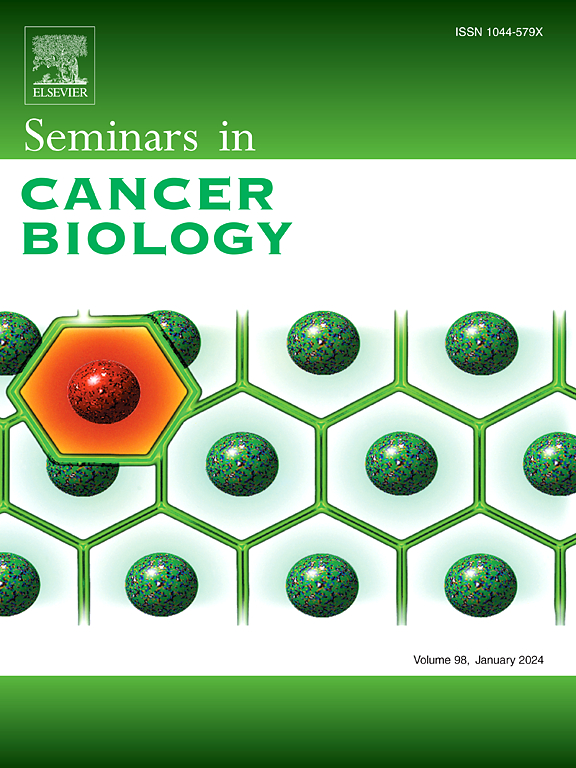胆汁酸在肝脏和胃肠道癌症中的作用。
IF 15.7
1区 医学
Q1 ONCOLOGY
引用次数: 0
摘要
胆汁酸(BAs)是由肝细胞合成的胆固醇衍生代谢物,在胆汁中分泌,在器官间转运到肠道,促进脂肪消化和脂质和脂溶性维生素的吸收。传统上认为它们只是胆固醇分解代谢的最终产物,现在人们认识到它们通过控制关键基因的表达在调节中间代谢中起着复杂的作用。此外,它们对炎症、细胞毒性和致癌作用有重要影响。此外,ba对肠道微生物群与宿主生理之间的串扰具有重要影响,从而影响肝脏和胃肠道癌症的进展。动物模型研究的临床数据和结果支持BAs参与肝细胞癌、胆管癌、结直肠腺癌和胰腺癌的发展。另一方面,BAs及其衍生物已被提出作为恢复肝胆功能异常和靶向细胞抑制剂治疗肠肝回路癌症的药理学工具。在本文中,我们总结了BA生理和调控的基本概念,以及这一不断扩大的癌症生物学领域的新进展,进一步支持BA在肝脏和胃肠道癌症中的关键作用。本文章由计算机程序翻译,如有差异,请以英文原文为准。
Bile acids in liver and gastrointestinal cancer
Bile acids (BAs) are cholesterol-derived metabolites synthesized by hepatocytes and secreted in bile to follow an inter-organ transit to the intestine, where they facilitate fat digestion and the absorption of lipids and liposoluble vitamins. Traditionally considered mere end products of cholesterol catabolism, they are now acknowledged to play intricate roles in regulating intermediary metabolism by controlling the expression of crucial genes. Additionally, they exert a significant impact on inflammation, cytotoxicity, and carcinogenesis. Moreover, BAs have a critical impact on the crosstalk between gut microbiota and host physiology, which affects the progression of liver and gastrointestinal cancers. Clinical data and results from studies of animal models support the involvement of BAs in the development of hepatocellular carcinoma, cholangiocarcinoma, colorectal adenocarcinoma, and pancreatic cancer. On the other hand, BAs and their derivatives have been proposed as pharmacological tools in strategies to restore abnormal hepatobiliary function and target cytostatic agents to cancers of the enterohepatic circuit. In the present review, we summarize basic concepts of BA physiology and regulation, as well as new advances in this expanding field of renewed interest for cancer biology, lending further support for the key role of BAs in liver and gastrointestinal cancer.
求助全文
通过发布文献求助,成功后即可免费获取论文全文。
去求助
来源期刊

Seminars in cancer biology
医学-肿瘤学
CiteScore
26.80
自引率
4.10%
发文量
347
审稿时长
15.1 weeks
期刊介绍:
Seminars in Cancer Biology (YSCBI) is a specialized review journal that focuses on the field of molecular oncology. Its primary objective is to keep scientists up-to-date with the latest developments in this field.
The journal adopts a thematic approach, dedicating each issue to an important topic of interest to cancer biologists. These topics cover a range of research areas, including the underlying genetic and molecular causes of cellular transformation and cancer, as well as the molecular basis of potential therapies.
To ensure the highest quality and expertise, every issue is supervised by a guest editor or editors who are internationally recognized experts in the respective field. Each issue features approximately eight to twelve authoritative invited reviews that cover various aspects of the chosen subject area.
The ultimate goal of each issue of YSCBI is to offer a cohesive, easily comprehensible, and engaging overview of the selected topic. The journal strives to provide scientists with a coordinated and lively examination of the latest developments in the field of molecular oncology.
 求助内容:
求助内容: 应助结果提醒方式:
应助结果提醒方式:


